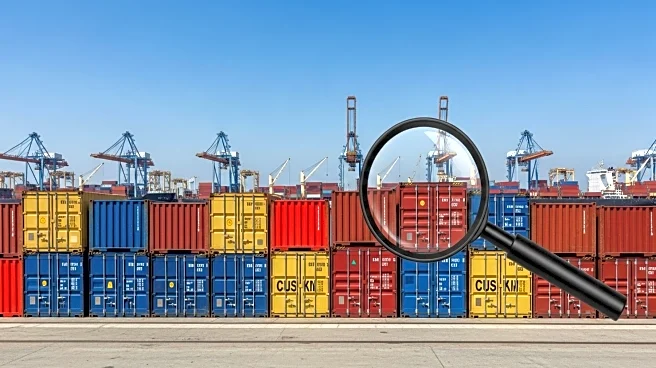What is the story about?
What's Happening?
DHL is increasing its hiring of customs agents in response to changes in U.S. shipping dynamics influenced by President Trump's trade policies and reshoring efforts. Tim Robertson, CEO of DHL Global Forwarding, noted that the current peak shipping season is atypical, with freight volumes from China to the U.S. experiencing significant declines. The trade war has led to fluctuations in freight demand, prompting DHL to adapt by hiring over 200 customs agents to manage increased shipping complexity and ensure compliance for importers. The company is also investing in sectors like life sciences and pharmaceuticals, which are seeing growth due to reshoring.
Why It's Important?
The hiring spree by DHL highlights the impact of trade policies on logistics and supply chain operations in the U.S. As tariffs and reshoring efforts reshape trade routes, companies like DHL must adapt to new regulatory environments and customer needs. The increase in customs agents reflects the growing complexity of international trade and the need for expertise in navigating tariffs and compliance. This development could benefit small and medium-sized importers by providing them with better support and visibility in their shipping processes.
What's Next?
DHL's investments in customs services and other sectors suggest a strategic shift to accommodate long-term changes in trade dynamics. The company may continue to expand its workforce and infrastructure to support evolving customer demands and regulatory requirements. As reshoring trends persist, DHL and other logistics firms might explore further opportunities in domestic manufacturing and supply chain optimization. The broader logistics industry could see increased competition and innovation as companies adapt to the new trade landscape.
Beyond the Headlines
The reshoring trend driven by trade policies raises questions about the future of global supply chains and the balance between domestic and international manufacturing. Ethical considerations around labor practices and environmental impact may emerge as companies adjust their operations. The cultural shift towards domestic production could influence consumer preferences and national economic strategies, potentially leading to long-term changes in trade relations and industry standards.















